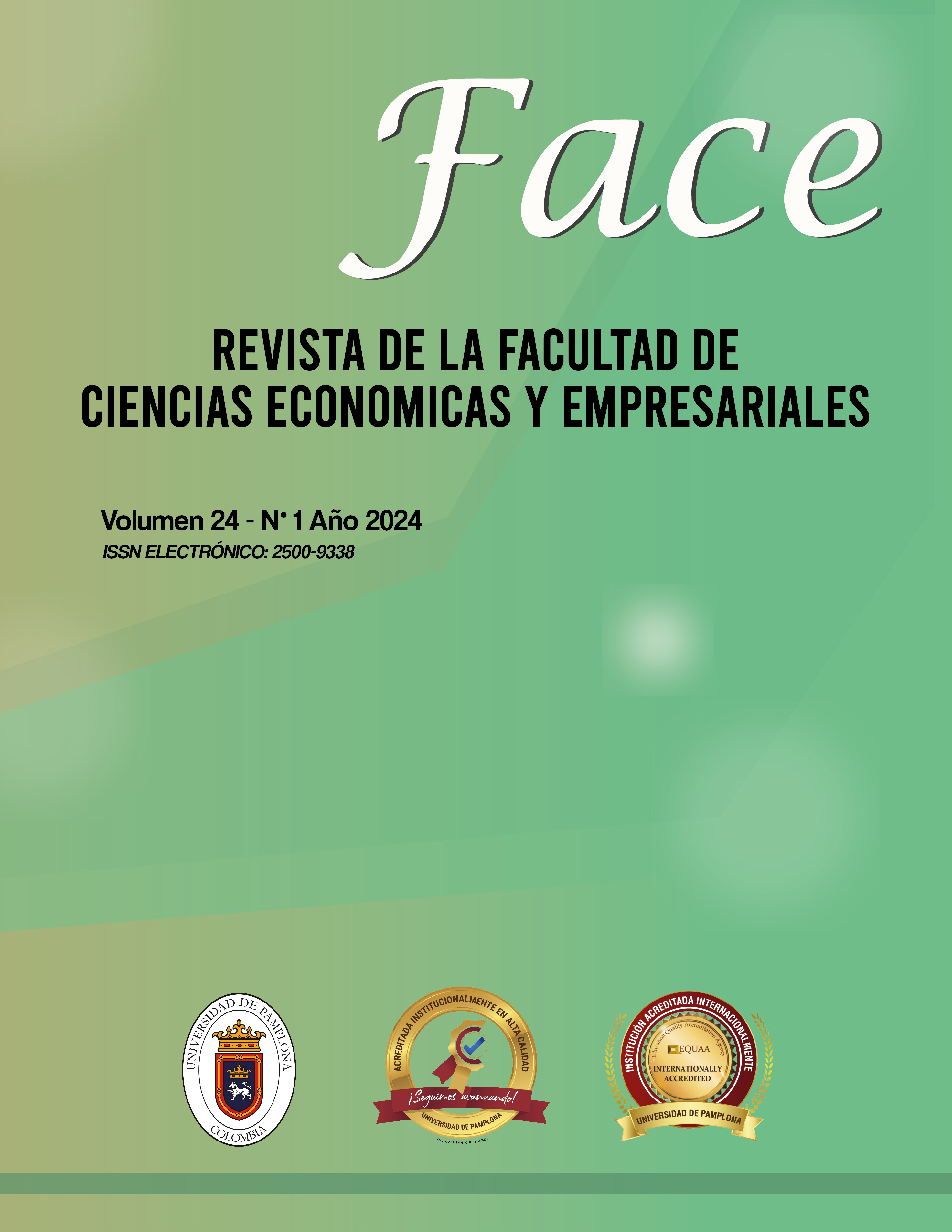La gestión presupuestaria, clave del éxito de las pymes
DOI:
https://doi.org/10.24054/face.v24i1.2947Palabras clave:
Gestión, Presupuesto, PYMESResumen
Los presupuestos son una brújula y una luz de guía para las empresas. Por lo tanto, la dirección y los propietarios de pequeñas y medianas empresas (PYMES) deben llevar a cabo actividades y métodos de presupuesto de capital adecuados y precisos para garantizar la longevidad y el progreso del negocio. Existe un alto riesgo de que las PYMES quiebren poco después de su creación, y una de las causas probables es la falta de capacidad de gestión. Así, el estudio tiene como objetivo evaluar las habilidades de gestión de la planificación y las prácticas del presupuesto de las PYMES, Metodología. Se utilizó como método de investigación un análisis cuantitativo, se adoptó un diseño descriptivo y un instrumento mediante el cuestionario con escala de Likert, los datos, que se convirtieron en valores numéricos, se analizaron mediante un programa científico de análisis estadístico; con la ayuda de una configuración del software SPSS. Resultado. La importancia de utilizar técnicas de control presupuestal debido a su impacto en elevar el desempeño financiero de la organización al controlar los costos de la organización, es revisar las diferencias en el presupuesto, asignar sus recursos y elegir las mejores inversiones para el retorno del capital. Conclusiones. El estudio demostró que el mayor porcentaje de propiedad de las PYMES son empresas unipersonales y corporaciones cerradas. Los ejecutivos en gran medida no son conscientes de su solvencia crediticia, de las diversas políticas, normas y programas ofrecidos por los entes gubernamentales.
Descargas
Referencias
Awad-Warrad, T. (2018). Trade openness, economic growth and unemployment reduction in Arab Region. International Journal of Economics and Financial Issues, 8(1), 179–183. https://www.econjournals.com/index.php/ijefi/article/download/5573/pdf
Basch, R. J. (2017). Capitalization strategies for the sustainability of small businesses. Walden University. https://bit.ly/3Mwkkat
Bergeron, D. A., & Gaboury, I. (2020). Challenges related to the analytical process in realist evaluation and latest developments on the use of NVivo from a realist perspective. International Journal of Social Research Methodology, 23(3), 355–365. https://doi.org/10.1080/13645579.2019.1697167
Bouquet, V. (2017). Financial controllers look to the future. http://bit.ly/3lpM6uw
Bornay-Barrachina, M., López-Cabrales, A., & Valle-Cabrera, R. (2017). How do labor relations improve business innovation? The role of human and social capital. The International Journal of Human Resource Management, 28(9), 1363–1391. https://doi.org/10.1080/09585192.2016.1155166
Brown, J. L., & Howard, L. R. (2012). Principles and practice of management accounting. London: MacDonald and Evans Ltda. https://bit.ly/471ObQc
Chams, N., & García-Blandón, J. (2019). On the importance of sustainable human resources management for the adoption of sustainable development goals. Resources, Conservation and Recycling, 141, 109–122. https://doi.org/10.1016/j.resconrec.2018.10.006
Doncel, E., & Montes, C. (2017). The budget as a management control tool in financial management in MSME commercial companies [Postgraduate thesis]. Gran Colombia University: Bogotá. https://repository.ugc.edu.co/bitstream/handle/11396/4334/Presupuesto_herramienta_financiera_pymes.pdf?sequence=1
Dzomonda, O., & Fatoki, O. (2019). Assessing the impact of organizational culture on the entrepreneurial orientation of small and medium-sized enterprises in South Africa. Bangladesh Electronic Journal of Sociology, 16(1), 82–94. https://bit.ly/3MtBrJU
Egbide, B.-C., Adegbola, O., Rasak, B., Sunday, A., Olufemi, O., & Ruth, E. (2019). Cost reduction and growth strategies of selected manufacturing companies in Nigeria. International Journal of Mechanical Engineering and Technology, 10(3). https://papers.ssrn.com/sol3/papers.cfm?abstract_id=3451705
Jiménez, L., Manzano, O., & Gamboa, R. (2023). Gestión presupuestal clave de éxito en las pymes.
Kabiru, I., & Adah, A. (2013). Relevance of variance analysis in managerial cost control. Journal of Finance and Investment Analysis, 2(1), 61–67. https://ideas.repec.org/a/spt/fininv/v2y2013i1f2_1_5.html
Kimani, R. (2014). The effect of budgetary control on effectiveness of non-governmental organisations in Kenya. https://www.irjp.org/index.php/IRJEF/article/download/133/144
Lebigdata, fr. (2021). Business intelligence or business intelligence: definition and tools. https://www.lebigdata.fr/businessintelligence-definition
Li, Q., Guan, X., Shi, T., & Jiao, W. (2020). Green product design with competition and equity concerns in the era of the circular economy. International Journal of Production Research, 58(1), 165–179. https://doi.org/10.1080/00207543.2019.1657249
Martínez-Costa, M., Jiménez-Jiménez, D., & Dine Rabeh, H. A. (2019). The effect of organizational learning on interorganizational collaborations in innovation: an empirical study in SMEs. Knowledge Management Research and Practice, 17(2), 137–150. https://doi.org/10.1080/14778238.2018.1538601
Mazikana, A. T. (2019). The effect of budgetary controls on the performance of an organization. SSRN. https://papers.ssrn.com/sol3/papers.cfm?abstract_id=3451705
MinCIT. (2023). Microenterprises strengthen the Colombian business fabric. https://bit.ly/3QLiUv6
Nafisatu, A. (2018). Effect of budget and budgetary control on firm’s performance: a case study of the East African Portland Cement Company Limited. https://bit.ly/3QoLp0l
Nguyen, D. (2019). Application of capital budgeting methods in small and medium-sized enterprises: case studies of SMEs in Vietnam. University of Turku. https://www.theseus.fi/handle/10024/169439
Premchand, A. (2004). Government budget and expenditure controls: theory and practice. International Monetary Fund. https://link.springer.com/chapter/10.1057/9781137315304_8
Orobia, L. A., Nakibuuka, J., Bananuka, J., & Akisimire, R. (2020). Inventory management, managerial competence and financial performance of small businesses. Journal of Accounting in Emerging Economies, 10(3), 379–398. https://doi.org/10.1108/JAEE-07-2019-0147
Oyelaran-Oyeyinka, B. (2020). Resurgent Africa: Structural transformation in sustainable development. Anthem Press. https://www.jstor.org/stable/j.ctvr6963z
Otieno, B. O. (2019). Effect of uses of budgetary control on financial performance of public universities in Nairobi County, Kenya (Doctoral thesis). http://bit.ly/3X6nJz5
Parra, J., & La Madriz, J. (2017). Budget as an instrument of financial control in small family-structured businesses. Negotium, 13(38), 33–48. https://www.redalyc.org/pdf/782/78253678003.pdf
Robinson, M., & Last, D. (2009). Budget control model: the translation process. Accounting, Organization and Society. https://bit.ly/45VmXte
Señalin, L., Olaya, R., Herrera, J., et al. (2020). Budget management and business planning: some reflections. https://www.redalyc.org/journal/290/29065286026/html/
Warren, L., & Jack, L. (2018). The capital budgeting process and the energy trilemma: an analysis of strategic behavior. The British Accounting Review, 50(5), 481–496. https://doi.org/10.1016/j.bar.2018.04.005
Descargas
Publicado
Número
Sección
Licencia
Derechos de autor 2024 FACE: Revista de la Facultad de Ciencias Económicas y Empresariales

Esta obra está bajo una licencia internacional Creative Commons Atribución-NoComercial-CompartirIgual 4.0.





